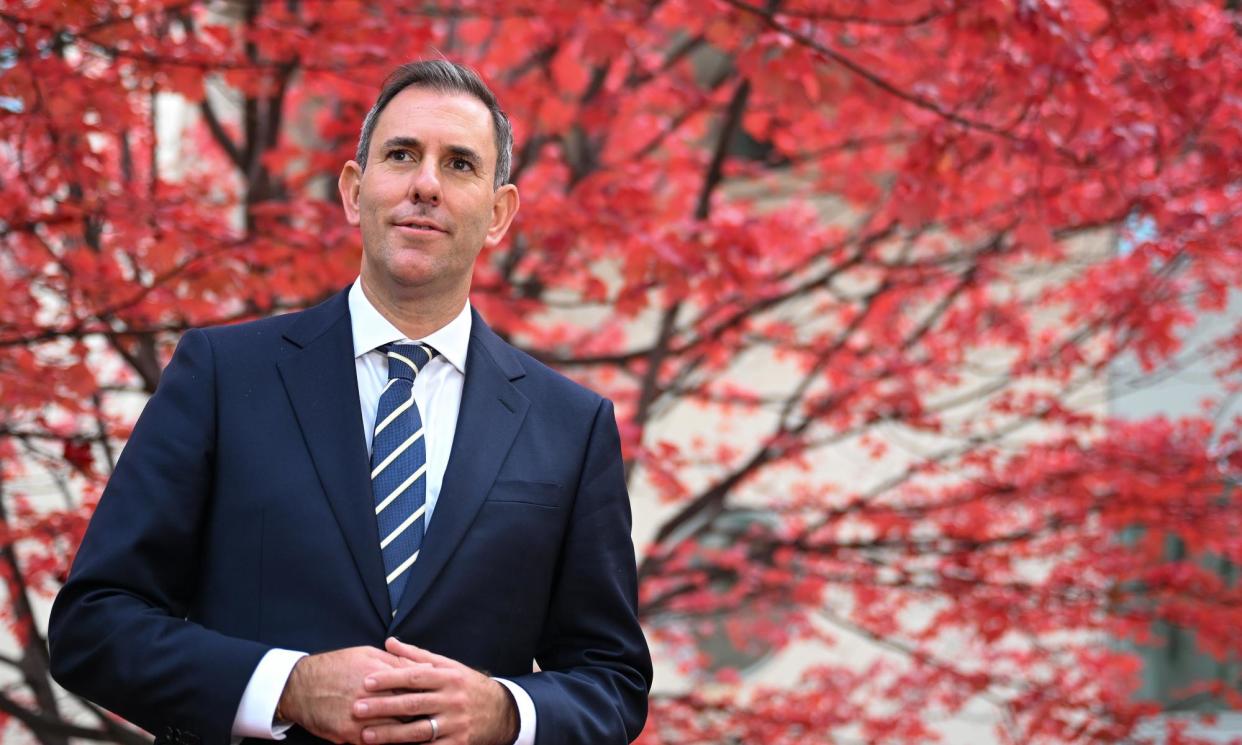Budget sneak peek predicts higher wages and tax breaks – but no increase for Australians on jobseeker

Australians are forecast to have more disposable income next year, according to budget predictions, with higher wages, tax cuts and lowering inflation.
But those on unemployment payments are unlikely to see any major change to their financial situations, with the government dampening expectations the base jobseeker rate will increase, despite growing pressure from economists, social justice groups and equality advocates.
The treasurer, Jim Chalmers, overnight released an advance look at budget figures, trumpeting a recovery in real household disposable income. His office said the average real disposable income is forecast to grow by 3.5% in 2024-25.
That comprises a 4.5% growth in labour incomes and 1% from the expanded stage-three tax cuts. The budget analysis says inflation is “expected to be a smaller drag” on incomes than in recent years, with the figures showing inflation slightly below 5% in 2024-25, a touch below the figure in 2023-24.
Related: Jim Chalmers warns restoring tax cuts to high earners would ‘smash’ budget by almost $40bn
Chalmers’ office said employment is expected to keep growing and noted nominal wages were growing at the fastest rate in 15 years. Labor’s revamped version of the Morrison-era stage-three changes will deliver an average tax cut of $1,888.
The budget’s cost of living centrepiece will be the previously announced tax cuts, though Chalmers has hinted at some level of additional assistance. The treasurer hasn’t ruled out changes to rent assistance but has dampened expectations of any further rise to jobseeker payments, with the government saying it has to balance any additional assistance against fears of further stoking inflation.
The Labor caucus has not put the same pressure as last year on the government to raise the base rate of jobseeker, with backbenchers who spoke to Guardian Australia referencing a “more consultative process” with the budget authors, and expecting relief in other areas.
That relief is most likely to be through an increase in commonwealth rent assistance, as well as an extension to the energy relief program. Other MPs say they are hopeful of changes to housing such as an extension of the Help To Buy program, or further changes to Hecs loan repayments. But the priority recommendation of the government’s own advisory committee – a raise in the base rate of the unemployment and associated payments – looks to be ignored.
The Jenny Macklin Economic Inclusion Advisory (EIAC) report recommended a raise in rent assistance and reform in how it was applied alongside an increase in the base rate of jobseeker in order to have any material impact on low-income and welfare households.
Commonwealth rent assistance is only paid once rent reaches a certain threshold and not everyone on welfare is eligible. It has also been linked to an increase in rental prices, which adversely affects those unable to access the payment.
The energy price relief program touted by the government is paid directly to energy suppliers, not households, and although it lowers bills it offers no direct financial assistance.
More than a dozen Labor backbenchers publicly called for a jobseeker rise before the last budget. The rate was increased by $20 a week but there has not been the same backbench campaign in 2024, despite growing calls from civil society.
More than 300 women and non-binary people from across academia, advocacy community, union and business groups have signed an open letter calling on the prime minister and treasurer to lift the base rate of jobseeker. Leading economists have signed a separate letter urging the government to lift the rate this budget.
Advocates for lifting the base rate above $55 a day argue its impacts on inflation would be negligible.
“From 1 July it seems we can afford to give $4,500 extra a year to people on the highest incomes, and tax cuts to middle-income earners across the board to help with cost of living … but lifting people out of the most severe and abject poverty on jobseeker at just $20k per year can’t be done?” the Australian Council of Social Service chief executive, Dr Cassandra Goldie, said.
“It’s not true and it’s cruel to keep saying it.”
Caucus members spoken to by Guardian Australia said they felt that already announced measures, such as the tax cuts and Hecs university loan changes, were making a difference, with many pointing to the treasurer’s hints on rental assistance and energy relief as “action”.

 Yahoo News
Yahoo News 
